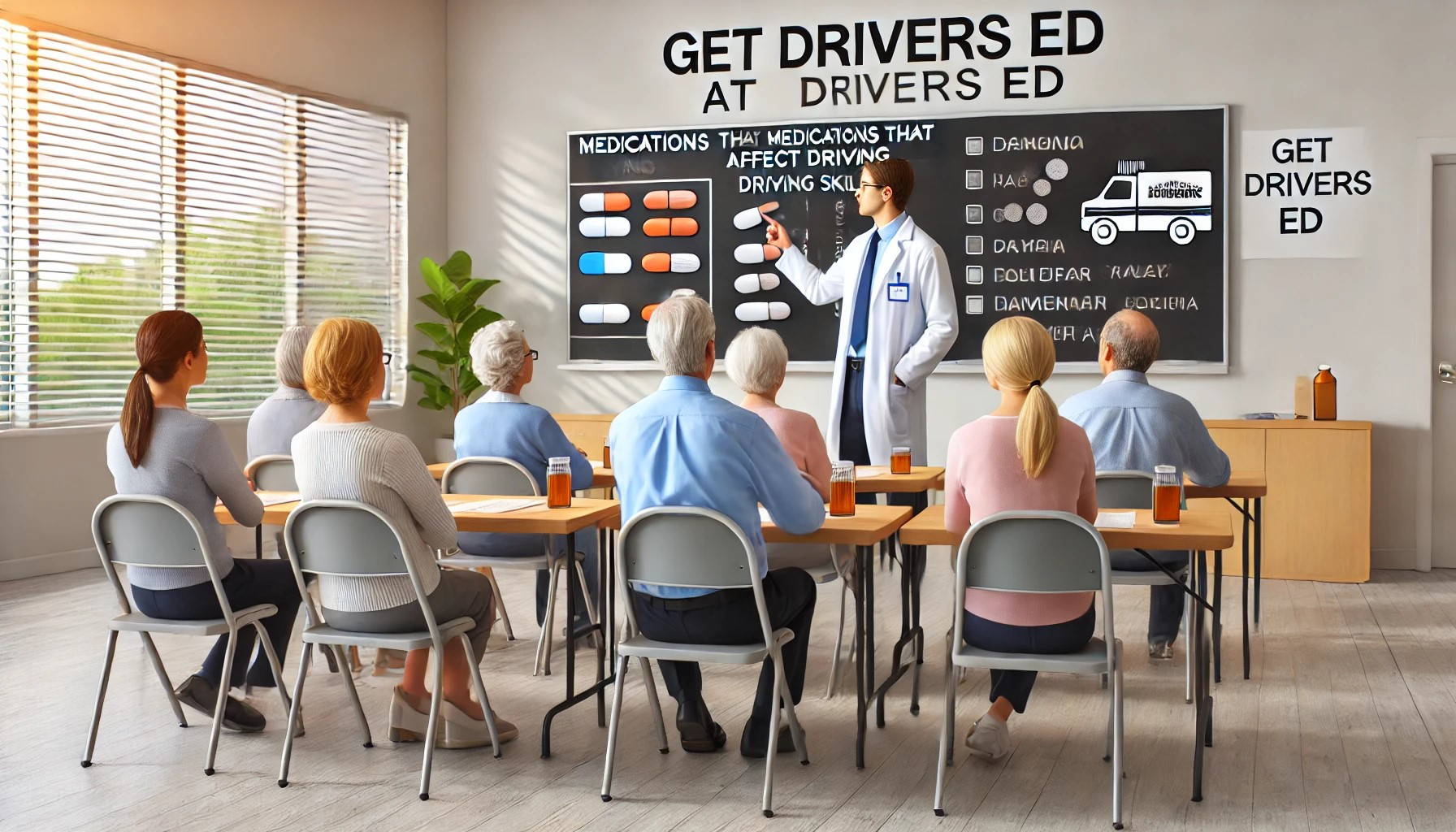Seniors, Here Are the Meds That Can Harm Your Driving Skills
As we age, maintaining our independence often involves continuing to drive. However, seniors must be aware of the potential impact medications can have on their driving abilities. At Get Drivers Ed, we prioritize the safety of all our drivers, including seniors. Understanding how certain medications can affect your driving skills is crucial for ensuring your safety and the safety of others on the road. In this blog, we'll discuss common medications that can impair driving skills and offer tips on how to manage these effects.
The Impact of Medications on Driving
1. Why Medications Affect Driving
Medications can influence your central nervous system, affecting your reaction time, coordination, and judgment. Seniors are particularly vulnerable as they often take multiple medications, increasing the risk of side effects that can impair driving abilities. Understanding how these medications interact with each other and with your body is key to maintaining safe driving habits.
2. Common Medications That Affect Driving
Several types of medications can impact driving skills. It is important to be aware of these and understand their effects:
Antihistamines: Used to treat allergies, these can cause drowsiness and slow reaction times.
Antidepressants: Some can cause dizziness, blurred vision, and slower reaction times.
Anti-anxiety Medications: Drugs like benzodiazepines can cause drowsiness and impair cognitive functions.
Pain Medications: Opioids and other pain relievers can slow reflexes and cause drowsiness.
Sleep Aids: These can cause drowsiness the next day and impair your ability to concentrate.
Diabetes Medications: Some can cause hypoglycemia (low blood sugar), leading to dizziness and confusion.
Blood Pressure Medications: Certain medications can cause dizziness and lightheadedness.
Managing Medication Effects on Driving
1. Consult Your Doctor
Always discuss your medications with your doctor, especially if you experience side effects that could affect your driving. Your doctor can adjust dosages, change medications, or offer alternatives that are less likely to impair your driving abilities. Regular check-ups and open communication about your driving concerns are essential.
2. Monitor Side Effects
Keep track of how you feel after taking your medications. If you notice any symptoms that could impair your driving, such as drowsiness, dizziness, or confusion, avoid driving and consult your doctor. Keeping a log of your side effects can be very helpful when discussing your concerns with your healthcare provider.
3. Schedule Your Driving
If possible, schedule your driving for times when you are least likely to experience side effects. For example, if your medications cause drowsiness, avoid driving in the morning or shortly after taking your medication. Planning your trips during times when you feel most alert can help mitigate risks.
4. Stay Informed
Read the labels and information provided with your medications. Be aware of potential side effects and how they might impact your driving. This knowledge can help you take proactive steps to ensure your safety. Educate yourself about each medication you take, including potential interactions.
5. Use Technology to Assist You
Consider using assistive technology in your vehicle, such as GPS systems that offer voice commands or advanced driver assistance systems (ADAS) that can provide alerts and assist with tasks like lane-keeping and braking. These technologies can help compensate for any diminished driving abilities due to medication side effects.
The Role of Drivers Ed for Seniors
At Get Drivers Ed, we understand the unique challenges seniors face when it comes to driving. Our drivers ed courses are designed to help seniors stay safe and confident on the road, even when dealing with the effects of medications.
1. Comprehensive Curriculum
Our curriculum includes information on how medications can affect driving and strategies for managing these effects. We cover topics such as recognizing side effects, consulting healthcare providers, and scheduling driving times effectively. This ensures that seniors are well-informed and prepared to handle their medication's impact on their driving.
2. Experienced Instructors
Our instructors are trained to work with seniors and understand the specific challenges they face. They provide personalized instruction to help you stay safe on the road. By focusing on individual needs and adapting teaching methods, our instructors ensure that every senior driver gets the most out of their training.
3. Practical Tips
We offer practical tips for managing medications and driving, such as keeping a log of side effects and consulting with your doctor regularly. These tips can help you maintain your independence while ensuring your safety. Additionally, we provide strategies for planning routes and understanding the best times to drive.
4. Supportive Environment
At Get Drivers Ed, we provide a supportive and encouraging learning environment. Our goal is to help you feel confident and safe while driving, regardless of the medications you take. We understand that learning new skills or refreshing old ones can be challenging, and we are here to support you every step of the way.
5. Continual Learning and Support
Our commitment to your safety doesn't end with the completion of our course. We offer ongoing support and resources to help you stay informed about safe driving practices and the latest information on medications. Whether through refresher courses or informative newsletters, we are dedicated to your continued safety on the road.

